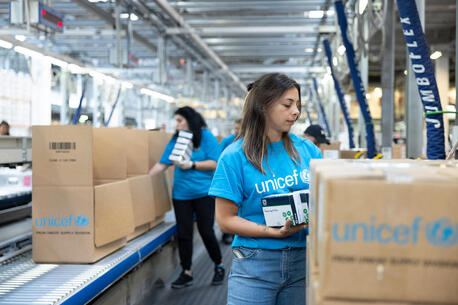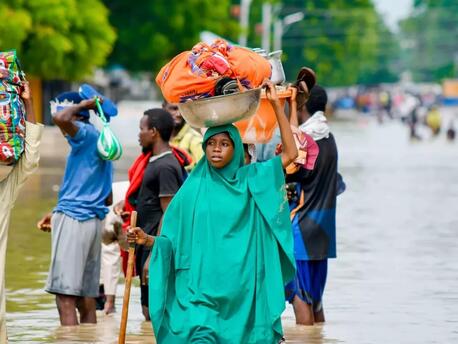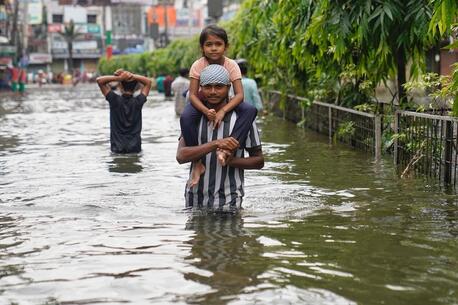
Emergency Supplies a Lifeline for Children and Families After Catastrophic Flooding in Libya
UNICEF is rushing more humanitarian supplies to aid children and families struggling to survive in northeastern Libya.
When disaster strikes, every minute counts
As the search for survivors continues in northeastern Libya, children and families caught in the path of catastrophic flooding caused by Storm Daniel remain in urgent need of emergency supplies and assistance.
Current estimates indicate up to 35,000 people are internally displaced after their homes either flooded or completely collapsed. Families are being hosted by relatives or are sheltering in schools and public facilities. Over 6,000 are confirmed dead; nearly 10,000 remain missing.

The aftermath of flooding is often more deadly for children than the extreme weather event itself
"The children of Libya are facing yet again another tragedy after over a decade of conflict," said Michele Servadei, UNICEF Representative in Libya. "Our priority is to scale up lifesaving assistance, in particular providing health and water and sanitation supplies, psychosocial support, family tracing and preventing waterborne diseases. To prevent a catastrophe, we can’t afford to lose any time.
"We know from previous disasters across the globe that the aftermath of floods is often more deadly for children than the extreme weather event itself," Servadei continued. "Children are among the most vulnerable and are at high risk of disease outbreaks, lack of safe drinking water, malnutrition, disruption in learning and violence.”

UNICEF's Global Supply and Logistics Hub in Copenhagen runs around the clock to rush aid to those in need
In the immediate aftermath of the floods, UNICEF partnered with the Libya Red Crescent (LRC) Society to deliver pre-positioned supplies — hygiene kits, medical supplies and essential clothing kits for children — and set into motion international shipments from UNICEF's global supply and logistics hubs, including UNICEF Supply headquarters in Copenhagen, the world's largest supply warehouse.
The first phase of UNICEF's international supply mobilization to Libya — more than 30 metric tons of medicines and medical equipment, high-performance tents and other vital supplies for children and families — includes:
- 71 medical kits (packed with equipment and medicine)
- 15 acute watery diarrhea (AWD) kits
- 25 high-performance tents
- 250 tarpaulins
- 100,000 water purification tablets
- 400 personal protective equipment (PPE) items
A second wave with another 40 metric tons of supplies is currently scheduled to be airlifted into Libya on Friday, Sept. 22. This will contain Ready-to-Use Therapeutic Food for children (RUTF), emergency food rations, water purification tablets, water tanks and emergency health kits.

Donor support is needed to meet the urgent needs of children caught in Libya's unfolding crisis
UNICEF Libya is working with partners to conduct a major needs assessment. In the days and weeks to come, UNICEF will be mobilizing more humanitarian supplies to support the health, education and psychosocial needs of children and families.
"The scale is quite unpredictable, to be honest," Servadei told CNN's Becky Anderson. "The needs are massive ... Our UN appeals need to be met with the appropriate resources ... The donors need to look at covering those humanitarian needs, because if they don't, nobody else will do it."
Your contribution helps UNICEF stay at the ready to help children whenever and wherever disaster strikes. Please donate today.
HOW TO HELP
There are many ways to make a difference
War, famine, poverty, natural disasters — threats to the world's children keep coming. But UNICEF won't stop working to keep children healthy and safe.
UNICEF works in over 190 countries and territories — more places than any other children's organization. UNICEF has the world's largest humanitarian warehouse and, when disaster strikes, can get supplies almost anywhere within 72 hours. Constantly innovating, always advocating for a better world for children, UNICEF works to ensure that every child can grow up healthy, educated, protected and respected.
Would you like to help give all children the opportunity to reach their full potential? There are many ways to get involved.




